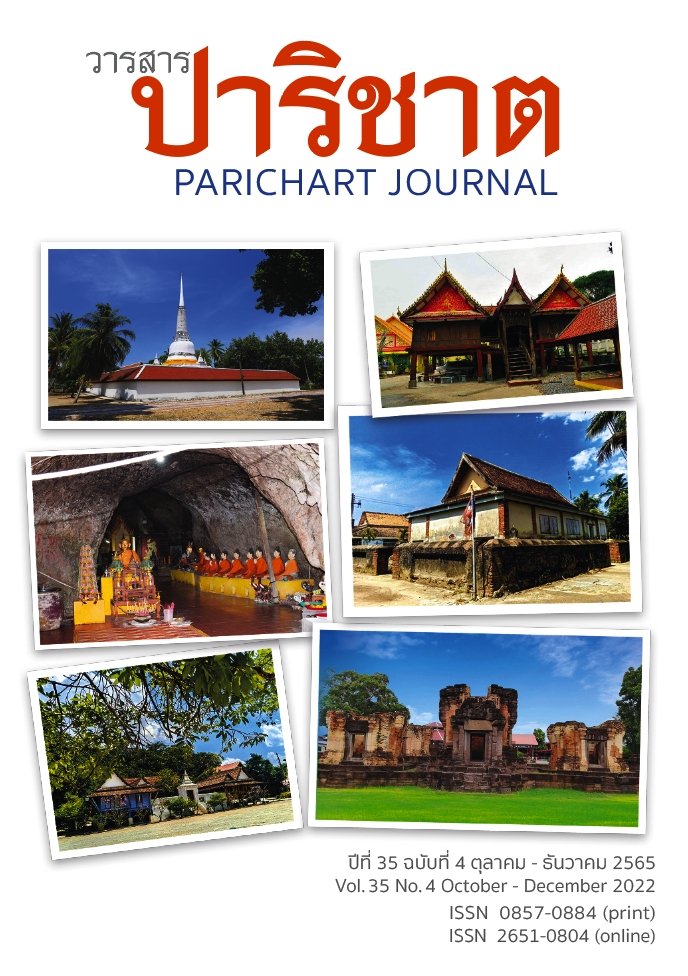The Transition of Ethnic Identity in Christian Ulak Lawoi of Lanta Island, Krabi Thailand after Tsunami Catastrophe in 2004
Main Article Content
Abstract
This article examines how the identity of the Ulak Lawoi ethnic group is defined after the 2004 tsunami disaster under the influence of changing religious beliefs. The presence of the Christian organization plays a crucial role in social and cultural changes among Ulak Lawoi ethnic in Lanta Island, Krabi. Even though their ethnic identity of animistic belief is insistently important. The social and cultural transformation as a result of the 2004 tsunami is a phenomenon that reflects the reduction of the role of traditional religion and shamans (To Moh), the spiritual leaders in the community. The reshaping of beliefs was molded by new social and cultural waves that come with support from the Christians organization, which resulted in the religious alteration. From a preliminary study, the researcher found out that a small group of Ulak Lawoi in the Sang Kha Ou community started to have different religious views. However, they still define themselves and others in the community who share the ethnic identity with different religious views as “Lu Moh Lawoi” or “We are Urak Lawoi.”
Article Details

This work is licensed under a Creative Commons Attribution-NonCommercial-NoDerivatives 4.0 International License.
References
Butler, N. (2018). The Urak Lawoi from pioneers become others. Rusamilae Journal, 39(1), 13-18. (In Thai)
Arunotai, N. et al. (2014). Cultural skill: Many stories of Moken Moklen and Urak Lawoi the brave people of Andaman. Princess Maha Chakri Sirindhorn Anthropology Centre. (In Thai)
Ukrit, A. (2011). The dynamics of interactions and ethnic maintenance of Lanta islanders in Krabi Province. Doctor’s Thesis. Thaksin University. (In Thai)
Srisukasai, Y. (2002). Socio-economic and cultural changes: A case study of Sanga-Ou Sea Gypsies at Ko Lanta, Krabi Province. Master’s thesis. Chulalongkorn University. (In Thai)
Nilsson, E. (2010). Waves of change: Traditional religion among the Urak Lawoi, Sea Nomads of Ko Lanta Thailand. VDM Verlag.
Barth, F. (1969). Ethnic groups and boundaries: The social organization of cultural difference. Universitetsforlaget.
Goonchorn Na Ayuthaya, M. (2007). Looking the Lanta Sea: From Tsunami to proud life. Milky Way Press. (In Thai)
Granbom, L. (2004). A field study of the original native people Urak Lawoi of The Adaman Sea Ko Lanta and the problems they face with rapid tourism development. Master’s thesis. The University of Lund.
Granbom, L. (2017). The second wave: The Urak Lawoi after the Tsunami in Thailand. Lund University.
Thaleluek, J. (2020, October 4). Personal interview [Personal interview].
Pramongkit, S. (2020, September19). Personal interview [Personal interview].
Pramongkit, W. (2020, September 29). Personal interview [Personal interview].
Ukrit, A. (1989). The boat float ritual: A reflection of the social and cultural life of Chao Le a case study in Ban Hua Laem, Ko Lanta Krabi Province, Thailand. Master’s thesis. Silpakorn University. (In Thai)
Hogan, D. W. (1972). Men of the sea: Coastal tribs of South Thailand’s west coast. The Journal of The Siam Society, 60(1), 205-235.
Kongkaew, S. (2020, September 2). Personal interview [Personal interview].
Prachuabmoh, C. (2004). Rethinking approaches of ethnic study across times: In ethnic approaches. Princess Maha Chakri Sirindhorn Anthropology Centre. (In Thai)
Leepreecha, P. (2014). Paradigms of studies on ethnicity. Journal of Mekong Societies, 10(3), 219-242. (In Thai)
Chaonam, C. (2020, December 17). Personal interview [Personal interview].
Thaleluk, W. (2020, October 14). Personal interview [Personal interview].


